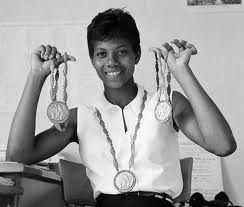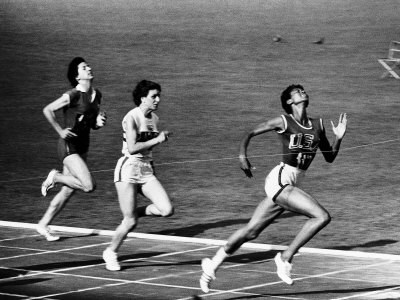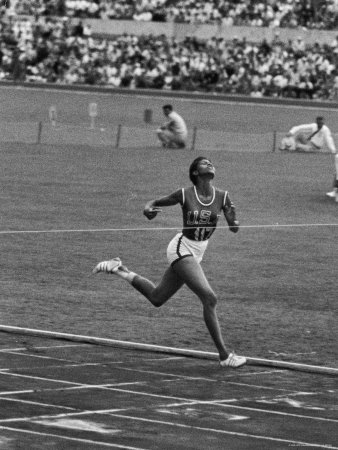 |
| Wilma Rudolph and her three godl medals. (http://www.gardenofpraise.com/ibdwilma.htm ()) |
Wilma Rudolph's record breaking three gold medals in one Olympics shows not only her strength in running, but her passion in living. Rudolph was definitely the woman athlete of her time, she was titled "the fastest woman in the world". She was born in Bethlehem, Tennessee, on June 23, 1940 however, shortly after, her family moved to Clarksville where she was raised. Rudolph was the twentieth of twenty-two children, and was a very sickly child. Every person is required to posses some sort of criteria making him or her a hero. For Wilma, these would be her outstanding lack of fear and her intense passion for fighting. From her success in walking, to becoming the fastest runner in her school, to having her own foundation, Rudolph was a determined athlete, a courageous human, and an inspiration to all.
 |
| Rudolph crossing the finish line. (http://www.art.com/products/p14005687-sa-i2829868/mark-kauffman-us-runner-wilma-rudolph-winning-womens-100-meter-race-at-olympics.htm ()) |
Not everything is always about wanting, sometimes you have to be courageous enough to take action. Wilma had to face more than just segregation: "Wilma was born prematurely and weighed only 4.5 pounds" (Women in History). Because of racial segregation, she and her mother were not admitted to be cared for at the local hospital because it was for whites only. "There was only one black doctor in Clarksville, and the Rudolph's budget was tight, so Wilma's mother spent the next several years nursing Wilma through one illness after another: measles, mumps, scarlet fever, chicken pox and double pneumonia. But, she had to be taken to the doctor when it was discovered that her left leg and foot were becoming deformed. She was told she had polio, a crippling disease that had no cure. The doctor told Mrs. Rudolph that Wilma would never walk" (Women in History). Wilma had the bravery to run straight towards the things that stopped her most. She had the will to be something great. Being just average was something Wilma never wanted, so it never happened. Not only did she have to face physical hurdles, Wilma grew up poor and an outcast: "As a child she suffered from scarlet fever and pneumonia and was stricken with polio, which left her without the use of her left leg," (Nadasen). Wilma had to face something so huge, and she never quit. Her whole childhood, she was forced through many tough hardships. Rudolph proves that when a part in life seems to be rock bottom that just means that there is something to work for. Rudolph was never able to be a real child because she had to spend her time doing exercises and stretches that were the only hope of her ever walking. She is a main example of showing that anything is possible. Wilma didn't let "minor" setbacks keep her from reaching her dreams; she used them to fuel her desire to be everything that she could be.
 |
| Rudolh winning the 100 meter dash. (http://www.art.com/products/p14008341-sa-i2848061/george-silk-us-sprinter-wilma-rudolph-winning-womens-100-meter-dash-in-olympics.htm ()) |
Keep moving forward are three small and simple words, yet when put together they make a enormous impact. Wilma Rudolph never said no, she was determined to do the unthinkable...walk. Rudolph was forced to face many tough obstacles, but she never stopped pushing herself to be better. "By the age of twelve Rudolph was the fastest runner in her school," (Nadasen). Not only did Rudolph have the heart to go on, but she had the fire it takes to do so. Rudolph proves that when one has the will to do something, all it takes is a little elbow grease. Working hard doesn't have to be a job, Wilma made it a hobby. Wilma was born into an incredibly supportive family. "And you see, when you come from a large wonderful family, there's always a way to achieve your goals, especially when you don't want your parents knowing them. I would take off my braces, then station my brothers and sisters all through the house and they would tell me if my parents were coming and I'd hurry and put the braces back on," ("Wilma Rudolph" Contemporary). Nothing was going to stop Wilma from reaching her goals, no matter how unimportant they seemed. By her doing these simple things she became stronger and stronger allowing her to become the amazing woman we know her to be. Just because something seems far away, doesn't mean the journey won't help the time fly by.
Wilma Rudolph is a huge inspiration to everyone, especially the ones who have obstacles standing in their way. Not only did Rudolph do the impossible by walking, but she became the biggest athlete celebrity at in her time: "Wilma Rudolph made history in the 1960 Summer Olympic games in Rome, Italy, when she became the first American women to win three gold medals in the track and field competition," ("Wilma Rudolph."Contemporary). Here there is a woman who was told she would never walk winning three gold medals, in track and field. After this, everyone should feel able, and motivated to reach their dreams. So many in the world are afraid to shoot for their dreams, no one is incapable. Rudolph was never supposed to walk yet she won three Olympic golds. In track. Not only that, but Rudolph wanted to give back and help her community: "Founder of Wilma Rudolph Foundation, a nonprofit organization for amateur athletics in Indianapolis, IN. Has made numerous lecture tours and good-will appearances" ("Wilma Rudolph."Contemporary). After Rudolph retired from her career as a runner, she created her own organization. This foundation reaches out to underprivileged children in certain areas, providing free coaching and academic assistance.
Being a jock isn't always a bad thing. Wilma was so determined to be everything in her power, to face everything in her way, and to show everyone that there truly isn't a mountain too high to climb. "Rudolph set a world record, 22.9 seconds in the 200-meter race; the record stood for eight years" (Berlage).Wilma Rudolph inspires people to always do their best, that winning is great, but it's great to be happy with whatever one accomplishes. Rudolph also shows people with setbacks that there are people always there for support: "The disease weakened her and made her vulnerable to pneumonia and scarlet fever. She survived the illnesses, but she lost the use of her left leg. Specialists form Nashville recommended a routine of massage for the limb, and Mrs. Rudolph learned it and taught it to some of the older children," ("Wilma Rudolph" Contemporary). Not only Wilma, but her family was willing to work hard for Rudolph. She inspired her family with her hard work, and they showed their heart by helping. She really shows me that some things that seem to be hard to overcome, are quite small in the big picture. This doesn't apply to only physical things, but the mental state of "I can do anything", gives a single person the power to do anything.
Works Consulted
Berlage, Gai Ingham. "Wilma Rudolph." Scribner Encyclopedia of American Lives, Thematic
Series: Sports Figures. Ed. Arnold Markoe and Kenneth T. Jackson. New York: Charles Scribner's Sons, 2003. Gale Biography In Context. Web. 10 May 2012.
Nadasen, Premilla. "Wilma Rudolph." Encyclopedia of African-American Culture and History.
Gale, 2006. Gale Biography In Context. Web. 8 May 2012.
"Wilma Rudolph." Contemporary Black Biography. Vol. 4. Detroit: Gale, 1993. Gale Biography
In Context. Web. 8 May 2012.
Women in History. Wilma Rudolph biography. Last Updated: 5/8/2012. Lakewood Public
Library. Date accessed 5/8/2012 .
Page created on 5/27/2012 12:00:00 AM
Last edited 5/27/2012 12:00:00 AM
